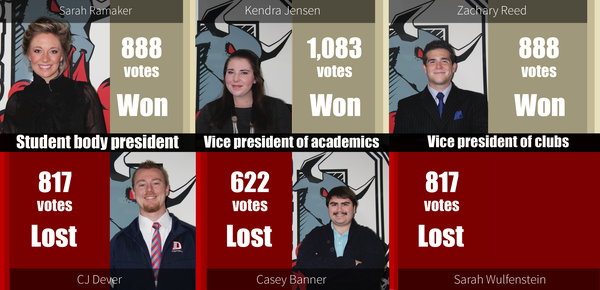Several candidates for Dixie State University’s Student Association executive council have advanced, but they don’t all agree on the same campaigning strategy.
The final candidates vying for student body president are CJ Dever, a senior business administration major from Provo, and Sarah Ramaker, a senior dance major from Midland, Michigan. Each candidate garnered 336 and 780 votes respectively, which knocked Ezra Hainsworth, a junior communication major from St. George, out of the race. Hainsworth collected 295 votes.
For the vice president of clubs position, Zach Reed, a sophomore accounting major from Peoria, Arizona, walked away from primaries with 649 votes. His competitor Sara Wulfenstein, a junior business administration major from Pahrump, Nevada, garnered 397 votes. Cajun Syrett, a sophomore integrated studies major from Bryce Canyon City, trailed behind Wulfenstein with 346 votes.
Vice president of academics hopefuls, Casey Banner, a junior secondary education major from Las Vegas, and Kendra Jensen, a junior English major from Richmond, will both move on in the final elections process.
Ramaker said she’s overjoyed with excitement and gratitude.
“I’m just going to keep explaining to people why I’m the best person for the job,” she said. “I beat [Dever] by a lot, but I’m not going to stop or think I have it in the bag or anything.”
On the other hand, Dever said, while he’s thankful he’s advancing to final elections, he was frustrated when he saw the difference in the amount of votes he collected compared to Ramaker.
By seeing how the election process works as someone who has no previous involvement with DSUSA, Dever said the election process is “honestly appalling” and doesn’t stand for a true election. Rather than focusing on popularity, Dever said the voting system should focus more on educating the students in-depth about what the candidates plan to do.
“I don’t think the voting system that has been implemented is the most efficient and accurate way to show what the students actually want,” Dever said. “[Ramaker] has the popularity, (and) I don’t.”
Ramaker said she’s not running for office because she likes politics and that the position shouldn’t be diminished to a popularity contest.
“I’m doing this because I love DSU,” Ramaker said. “I do know that being student body president is all about the students and their needs, so a student body president should be well-known around campus, accessible, available and approachable to students.”
Being knocked out of the race this soon in the game was something Hainsworth said he wasn’t expecting. He said his jaw dropped when he saw the primary results.
“I feel like I put in a lot of work, and I was expecting better results,” Hainsworth said.
Although he wanted to be next year’s student body president, Hainsworth said running was a learning experience that gave him insight for what he would do better if he decides to run again next year. In addition, he said he urges those who voted for him to rally behind a different candidate.
“Right after I saw the results, it sunk in for about five seconds, and I walked over to [Ramaker] and asked her for (one of her campaign’s) extra large T-shirts,” Hainsworth said. “There’s nothing I can do to change [the results], so I might as well move forward and support someone else.”
High school student government is all about popularity and student leaders don’t really have the power to do much, Dever said, but, in college, DSUSA representatives have the power to contribute to real change as long as it’s within their reach. Dever said this election has felt like a high school popularity contest.
“[Ramaker and Hainsworth] had ideas to reduce the price of textbooks and change the three-strike rule for athletes, and there’s no way to do those things as the student body president,” Dever said. “If [Ramaker] wins, and she doesn’t have a real firm way of making these things happen, it’s just a demonstration that politics here are a popularity contest.”
Ramaker said the plan for reducing the price of textbooks is already in place with the student senate, and when she says she plans on making initiatives happen, it’s something she plans to follow through with.
“It’s not me just saying something to get elected,” she said. “My only promise is that I will try my hardest to do my best always, and I will fight for the people who need fighting for.”
The candidates for student body president, VP of clubs and VP of academics will participate in a debate March 30 at noon in the Gardner Student Center living room. Students can vote in the final elections March 30 at noon until March 31 at 4 p.m online at students.dixie.edu/voting.
This article was updated on March 29 at 11:30 a.m.


